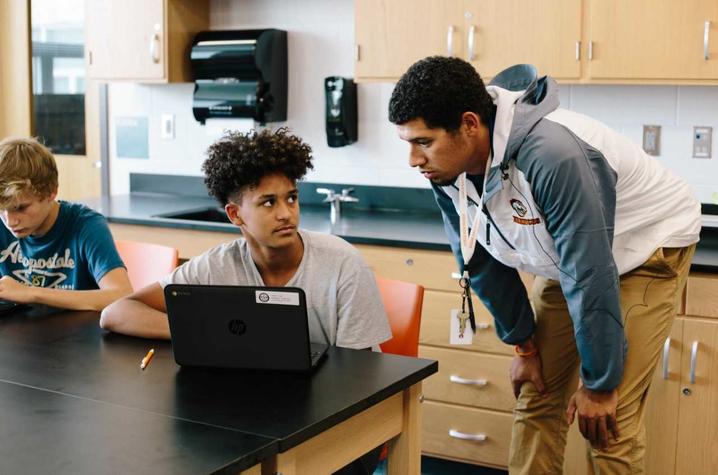STEM Education Honored for Physics Teacher Preparation
LEXINGTON, Ky. (May 3, 2019) — Five is a big number when it comes to addressing the shortage of physics teachers in the U.S.
The University of Kentucky was recently named one of only a handful of institutions in the U.S. — exactly five, as it so happens — graduating five or more high-quality physics teachers in the last academic year. Six physics teacher candidates completed programs in the UK College of Education's Department of STEM Education in 2017-18.
The Physics Teacher Education Coalition (PhysTEC) recently announced the newest inductees into “The 5+ Club,” a group of institutions that have graduated five or more physics teachers in a given year — a significant achievement, as most colleges and universities graduate only one physics teacher a year — or none at all. The result of collaboration between the College of Education, the College of Engineering, and the College of Arts and Sciences, UK College of Education’s STEM PLUS: Preparing Leaders for Urban/Rural Schools program, the first STEM Education major program in the U.S., and the Master of Arts in Teaching (MAT) program created both undergraduate and graduate pathways to physics certification for candidates with unique needs.
This helps to address the national shortage of high school physics teachers, the most critical shortage in the teaching profession. Of the approximately 1,400 new teachers across the nation who are hired to teach physics each year, only 35 percent have a degree in physics or physics education. By comparison, all UK students who complete programs to teach physics graduate with a major in physics or an equivalent number of hours for the physics major.
Through STEM PLUS, undergraduate students pursue a double major in STEM education and a science (i.e., mathematics, physics, chemistry, earth science, physical science, computer science), along with secondary teaching certification (grades 8-12) in one or more state-certifiable STEM subjects.
The MAT program is for students with an undergraduate degree (or recognized equivalent) in a STEM discipline. The students study in a hybrid online/on-campus format and have the option to pursue a one-year or two-year path to earn the master’s degree and apply for teaching certification.
"STEM PLUS provides a pathway to a dual major, and that gives candidates options moving forward. For the MAT program, it is the flexibility of different timelines to completion that can accommodate the circumstances of various post-baccalaureate candidates," said Brett Criswell, Secondary Science Program chair and clinical assistant professor in STEM education. “The '5+ club' is a great achievement because of the tremendously low output of physics teachers nationally. Only about a half dozen institutions across the entire country met that target. For UK, this is partially a function of the great collaboration between colleges.”
Faculty from the colleges of Education, Arts and Sciences and Engineering teach secondary STEM education program courses and work together to support the program in various ways, including securing grants. A centerpiece of this funding is the UK-NOYCE Fellowship program supported by the National Science Foundation. The program provides scholarships for undergraduate students majoring in a STEM discipline and seeking to become teachers in mathematics and/or science. Fellowship amounts are $10,000 per year.
Another key to success for the program is community support. For example, businesses and industries host UK STEM education candidates in summer externships, providing further real-world experiences for students.
“The STEM Education department continues to try to innovate to form partnerships such as these to draw the next cohort of STEM — and physics — teachers into this noble profession,” Criswell said.
The institutions recognized by the PhysTEC 5+ Club for the 2017-18 academic year are:
- University of Kentucky (six graduates);
- Brigham Young University (21 graduates);
- Rutgers The State University of New Jersey (eight graduates);
- Virginia Tech (eight graduates); and
- The College of New Jersey (five graduates).
PhysTEC, a flagship education program of the American Physical Society (APS) and the American Association of Physics Teachers (AAPT), aims to improve the education of future physics teachers by transforming physics departments, creating successful models for physics teacher education programs, and disseminating best practices.






